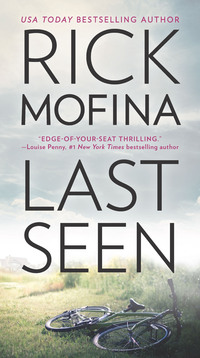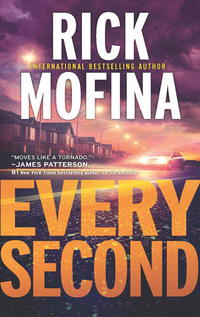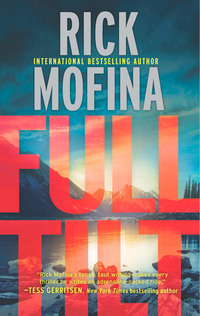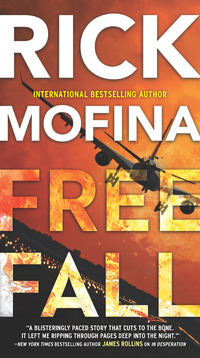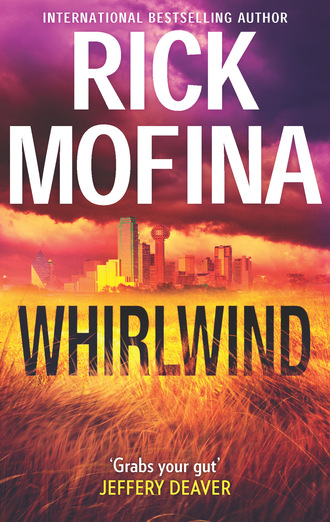
Полная версия
A Kate Page novel
The woman’s lower left calf had a twelve-inch gash to the bone. The woman was losing blood. Kate’s first aid was rusty, but she knew they had to clean that wound and get pressure on it to stem the bleeding. She pressed the woman’s hand back on the cloth.
“Hold it down firm.”
Kate looked around, called for paramedics, for firefighters, but none were near. Nothing that looked clean, no fabric, nothing was at hand. Kate removed her shirt’s belt, then cut the bottom of her shirt against a broken window and tore long strips from it. She used her shirt to treat the wound then wrapped the clean strips around it and used her belt for pressure.
“Please don’t leave me,” the woman said.
Kate took her hand and sat with her while calling for help.
“I was in the office,” the woman said. “Everything outside went black. The whole office twisted off the ground, the windows exploded, the walls started wobbling like rubber. I was hurled around like a doll in a blender. The desk, the chair, smashed into me. Broken glass flew like bullets. I was going to die.” Tears were streaming down the woman’s face. “Bless you for helping me.”
Kate consoled her until paramedics arrived.
As Kate continued to the Saddle Up Center she spotted a satellite truck for WFGG-TV News, reminding her that she needed to get a story to Chuck at the bureau.
I need to file now, before I get to the center.
She sat near two crushed cars with Xs, paged through her notes and began writing on her cell phone. She had the story structured in her head and her fingers moved fast. The screen smeared with blood as she typed, finishing at the five-hundred word mark.
There’s no cell service. How will I get this to the bureau?
The answer was in the distance.
She hurried to the WFGG-TV satellite truck with its dish extended on the pole above. Satellite phones didn’t need cell phone networks, they worked anywhere. No one was around. She pounded on the doors. A man in his mid-twenties with a stubbled face opened a side door. Jaw clenched, he stared at Kate.
“What is it?”
“I’m Kate Page, a reporter with Newslead.”
“Yeah, so? I’m busy.”
“What’s your name?”
“Fitch, but I’m busy.”
She saw the array of small monitors, computers and equipment.
“You guys have a satellite phone, right, Fitch?”
“We’ve got satellite everything.”
“There’s no cell service. I need your help now. I need you to take a file off my phone and send it to my desk over your sat system.”
“Sorry, I’m busy.”
“Fitch, please, I’ll give you twenty bucks.”
He looked at her, considered the deal.
“Thirty.”
“Come on, where’s the professional camaraderie?”
“Thirty.”
“Okay, thirty. Deal.”
“Let me see your phone.”
Kate gave it to him. He examined the ports.
“I should have a transfer cable for that. What is it you need to move?”
Kate took the phone, showed him her file named “Storm-1”.
“Just text?” He turned to his workstation, rummaged through a box of wires and adapters, fished out a cable, connected one end to Kate’s phone, the other to a laptop.
“Yes, no images.”
He typed a few commands, and seconds later Kate’s story appeared on his laptop.
“Where’s it going?” he asked. “You can email it.”
Kate gave him the newsroom email address for filing stories.
“Type ‘Urgent from Kate Page’ in the subject line.”
Fitch angled the laptop to Kate.
“You go ahead, write what you need. Keep it short.”
She stepped inside, set her things down and typed:
No phone service at the flea market. WFGG let me use their satellite. Will file more soon, Kate Page.
After sending her story, Kate typed another email to her friend Heather in Ohio.
“Hey, what’s that?”
“Just letting my daughter know I’m okay.”
Kate was fast, hit Send then went through her wallet. All she could find were twenties. She checked her pockets. No cash there. She passed Fitch forty dollars.
“I need the change, buddy.”
He slid his hand into his jeans and pulled out a five.
“That’s the best I can do. Sorry.”
“Whatever. Thanks for helping me, Fitch.”
“Otherwise you would’ve hurt me. I sensed that about you.”
“Ha-ha.”
Kate collected her things then took several steps from the truck.
“Hold on!” Fitch called. “You’ve got a reply here. Take a look.”
Kate returned and read the email.
Kate: You should’ve tried to reach us sooner. Can you find anything stronger? Your story has no reference to the Saddle Up Center, which you were told to focus on. Benny Lopez, one of our photogs, is on scene, you should find him fast. AP has already filed.—DP.
“What a hard-ass,” Fitch said. “AP has satellite phones.”
Kate’s face flushed at Dorothea’s remarks.
“Want to respond?” Fitch asked.
“No.”
Kate slammed the door like a gunshot when she rushed out of the truck.
6
Wildhorse Heights, Texas
“Help! Somebody help!”
What?
Jenna’s ears pricked to the sound of a faded response.
Someone was out there, far off.
She looked and felt around, clawed at the debris. The stroller was gone. The red-haired woman was gone. The man with her was gone.
No, this isn’t real!
“Caleb! Anybody? Help!”
This can’t be!
“Help! Somebody, over here! Help!”
“Hello!”
Someone was out there and getting closer. Jenna thrust her hands up to the wooden beams that were sealing their tiny cell like pickup sticks. She couldn’t budge them.
Her mind reeled; her head spun.
“Help! Somebody help!”
Something tugged at her shirt.
“Mommy, that lady’s scaring me,” Cassie said.
“What lady?”
“In there.”
Jenna repositioned herself to go as far as she could behind Cassie. She stopped at a bushy mass of white hair belonging to an old woman.
Jenna shot back. Bile gushed along the back of her throat as she battled nausea. A corpse! Oh, God! Jenna touched the back of her hand to her mouth, fought to regain her composure. All the while her scalp tingled.
I’m sorry.
The woman was in her seventies. Her head, shoulders and arms were sticking out from debris as if she’d attempted to swim out. One side of her face was torn off, revealing tissue, her teeth and skull. She was not moving, or breathing.
“Oh God, don’t look, honey.”
Jenna took the woman’s hand to feel for a pulse.
Nothing.
“Is she dead, Mommy?”
“Shh-shh,” Jenna took Cassie into her arms.
“Where’s Caleb? Are we going to be dead, too?”
“Don’t worry, honey. Somebody’s going to help us. We’ll find Caleb.”
“Will Daddy come?”
“We’ll call Daddy.”
Adrenaline-driven fear vibrated through every part of Jenna’s body.
“You’re shaking, Mommy.”
“I know, everything’s going to be o—”
“Can anybody hear us?”
A man’s voice, very close.
“Yes!” Jenna shouted. “Over here! Please help us! My baby’s missing! We have to find him! Please!”
“Can you move something to signal your position?”
Jenna found a length of pipe, shoved it straight up and wiggled it while shouting.
“Here! Over here!”
“We see it. Hold tight.”
More voices and muted radio talk filled the air along with the noise of debris being moved piece by piece. It took time before searchers, about six in all from a Dallas rapid-rescue squad, cleared their way to Jenna and Cassie and lifted them from the ruins.
“Please help me find my baby boy!” Jenna sobbed, pulling Cassie to her. “He’s five months old, he’s in his stroller. A lady was helping me hold him in the storm. I can’t find him! I can’t find her!” Jenna scanned the area, hysterical. “Help me!”
Jenna suddenly lunged toward the area where she and Cassie had been trapped, grabbing, kicking at pieces of wood, metal, plastic, tossing them wildly, causing small sections to shift then collapse, forcing new jagged spearlike sections to dangerously jut from the ocean of debris.
“Caleb! My baby!”
Members of the rescue team pulled her back.
“Ma’am,” said the thirtysomething man who held her shoulders. “Ma’am, my name is Steve Pawson, the squad leader. Try to take it easy. It’s not safe. We’re here to help. Your head’s bleeding. How badly are you two hurt?”
“My daughter’s got cuts on her face. I got bumped, but I’m okay.”
“Anybody else in there with you?”
“A woman. I think she’s dead. I have to find my baby!”
Pawson nodded to other members of the rescue party, who were still searching the area where they’d found Jenna and Cassie, while a female team member studied Jenna with calm concern.
“Ma’am, I’d like to take care of your wound.”
The woman took a pressure bandage from her backpack, wrapped Jenna’s head. “Let me help you and your little girl. My name’s Nancy. Can you tell me your names?” she asked while assessing their conditions.
“Jenna, Jenna Cooper and this is my daughter, Cassie. My baby son is Caleb. He’s missing.” Jenna looked frantically in every direction. “We have to find him now! Please!”
“All right, Jenna,” Pawson said. “We’re going to search everywhere for him. Nancy here will take you and your daughter to the first aid station.”
“No, I need to stay and look for my baby!”
“Jenna...” Pawson was firm and looked directly at her. “It’s not safe. You’re in shock. I give you my word we’ll keep searching everywhere. We have dogs coming to help us find people.”
Jenna stood there, numbed, not moving, not speaking.
“Go with Nancy, Jenna.” Pawson softened his voice. “There’s more help at the first aid station, people to take more information about your son.”
“But I have to look for him.” Her voice trailed. “I’m his mother. He needs me.”
“I know this is hard,” he said. “But you have to trust us.”
Tears rolled down Jenna’s blood-streaked face as she, Cassie and Nancy moved through the debris. With every step, Jenna concentrated, searching intensely for any trace of Caleb, but it was futile as the horror of the Saddle Up Center unfolded around them.
7
Wildhorse Heights, Texas
It was slow going for Jenna, Cassie and Nancy, trying to step through the wreckage of the Saddle Up Center without stumbling.
In every direction, more rescue teams sifted through endless heaps of smashed walls, remnants of vendor stalls, chunks of the building’s roof. The voices of those still buried and hurt called out as search-and-rescue dogs led their handlers, probing the destruction to pinpoint pockets of life. Workers carefully disentangled debris to extricate survivors.
Nancy led Jenna and Cassie to a canvas canopy erected at the edge of where the center had stood. Dozens of bleeding victims were being treated at the busy first aid station. Paramedics loaded those suffering the most serious injuries onto gurneys, hurried them to ambulances and on to hospitals. Victims in critical condition were being rushed to a landing site nearby to be transported by helicopter to hospitals.
Where is my baby?
Jenna scoured the activity for any sign of her son, all the while thinking how this couldn’t be real, this couldn’t be happening.
“Maybe they found Caleb and took him to a hospital?” she said to Nancy.
“That’s possible. Let’s get you both checked more thoroughly.” Nancy took them to a table where a patient had just been cleared by the nurse there.
“Jenna, this is Margot Tuttle.” Nancy then advised Margot about her initial assessment. “Be right back,” Nancy said. “I’m going to see someone to help with your son.”
Margot, a soft-spoken woman in her mid-thirties, checked Cassie and Jenna’s vital signs, shone a light in their eyes for any indication of brain or nerve injury, then treated Cassie’s face, gently dabbing it with cotton swabs.
“I’m just cleaning your cuts, sweetheart.”
Jenna continued scanning the area and other aid tables where medical people were helping the injured before asking Margot, “Has anyone seen a baby, a five-month-old boy?”
“No, not that young. Not yet. I’m sorry.” Margot glanced to a clipboard. “So far at our station, our youngest patients have been a two-year-old girl and a three-year-old boy. But we’re finding survivors, so we’re hopeful.”
Her heart racing, Jenna continued scanning the area surrounding the station while battling a rising tide of guilt and worry over Caleb.
How could I lose him? Why didn’t I hold him?
When Margot finished with Cassie, she reached under her table into a bag, took out a stuffed teddy bear and gave it to her.
“This guy’s for you. He needs someone to take care of him. Can you do that for me?”
Cassie hugged the bear and nodded. Margot then changed Jenna’s dressing. “Looks like you took a nasty bang to your head,” she said as she cleaned her wound and put on a new bandage.
Afterward, Nancy returned and took Jenna and Cassie to another smaller post nearby where a woman and a younger man were at a table working on laptops. The woman took Jenna’s hands in hers.
“Hi, Jenna. Nancy told us about you. I’m Belle Walker. This is Denton Reeves, my partner. We’re here to help.”
Belle offered Jenna a folding plastic chair next to her so she could see her laptop’s screen. Cassie was given a chair nearby but could not see the screen. She hugged her bear in silence while staring at the ongoing rescue efforts around them.
“We’re working with the Dallas PD, county and state on a preliminary list of missing and people unaccounted for.”
“What does that mean exactly?” Jenna’s voice quivered.
“In these kinds of situations there’s a lot of confusion and chaos. People are hurt, they’re taken to a hospital without loved ones knowing, or they go to a first aid station or an aid post—we’ve got several here. Or they just go home, or to their hotel, or somewhere.”
“Or they’re still trapped?”
“Yes. Or—” Belle lowered her voice “—the storm—”
Jenna revisited images of the tornado tearing the center to pieces, seeing some people sucked up into the winds.
Belle didn’t finish her sentence, but Jenna understood.
“So we’re working on the list,” Belle said. “It will feed into a bigger database that will be shared with fire, police, paramedics, hospital, aid agencies, to help reunite people, okay?”
Jenna nodded, then said, “I’d like to call my husband...I can’t find my cell phone. Can you help me call him?”
“We can. After we’re done here we have buses taking people to the community hall near here—that’s our closest emergency shelter.” Again, Belle took Jenna’s hand and gave it a gentle squeeze. “They’ll have working phones there for you to use, and there will be counselors there if you feel like talking to someone, okay?”
“Yes, thank you.”
“Let’s get started,” Belle said.
They took down vital information, names, dates of birth, addresses.
“It’s usually a good idea to give us contact information for relatives in case we can’t reach you. We’ll put it into the system—it’s all confidential,” Belle said.
Jenna gave her the cell number for Blake and her sister, Holly, in Atlanta. Then Belle asked for more details on Caleb, everything she could think of that would identify him.
“He was, is, sorry—” Jenna wiped her tears. “He is wearing a blue-and-white-striped romper with a little elephant crest on it that’s lifting a bit on the right. The bottom snap is loose. He’s got a rocket-shaped birthmark on the back of his left calf. He’s in a folding umbrella stroller, navy with green, red-and-blue polka dots on a white seat. The left front wheel had some white paint on it that I’d spilled when I put a paint can away.”
As Belle entered the information quickly into her laptop the concern on her face deepened.
“You live in Lancaster.”
“Yes.”
“From our information it looks like it was hit hard. I’m sorry.”
Jenna closed her eyes tight.
“I’ll deal with that after I find my son.”
Denton Reeves then gave Jenna a photocopy of a floor plan of the Saddle Up Center.
“Please mark the area you were in when the storm hit.” He gave her a pencil. “As best as you can.”
Jenna marked the spot, recounting how the red-haired woman and her friend helped her, leading up to the time the tornado hit.
“The woman is in her mid-twenties, with short, spiky red hair. I know she had nice teeth, a nice smile,” Jenna said. “I don’t remember much about the man. Same age, wearing a T-shirt with a dog on it, I think. My bag with the clothes I’d bought for the kids was in the stroller’s basket.”
After Belle submitted the details, Denton said to Jenna: “Would you recognize the woman who helped you if you saw her again?”
Belle threw Denton a look of concern.
“I think so, why?” Jenna said.
Belle drew up close to Jenna and dropped her voice so Cassie wouldn’t hear. “We can show you video of the deceased recovered so far from the Saddle Up Center and the area nearby.”
Jenna stared at Belle, who continued in a near whisper.
“You’ve already been through so much and this won’t be easy. Would you be willing to look?”
“What is this? Is this your way of telling me my son’s among the dead?”
“No.”
“You tell me right now if he is because I want to see him. I have a right to see him!”
“No, we’re sorry...we don’t know,” Denton said. “Police made the video. They’re updating it as they recover more fatalities, and they’re requesting we show it to people who’re reporting missing persons. It’s a first step before allowing people into the area where the deceased are before they’re moved. It’s nearby.”
Belle placed her hand on Jenna’s.
Jenna took a deep breath, let it out slowly. “I’ll look at it.”
Jenna glanced protectively at Cassie. She couldn’t see Denton’s screen. He made a few keystrokes and a video played. The camera showed bodies arranged on the ground in a neat line, maybe twenty corpses. They were not covered and had varying degrees of damage.
Jenna held her breath and covered her mouth with her hand as her focus went to the smallest victims, seven little children. None looked any younger than two or three. No babies.
Oh God, it’s real! Those dead children! Their poor parents! Please, please don’t take Caleb from me! Please!
As the camera tightened and panned over each one, Jenna looked for any women with red hair, gasping when the camera found one. Instantly she thought of the spiky-haired stranger who’d complimented her on Caleb and Cassie at the clothing table; her smile and how she’d led them to safety in the center, holding Caleb’s stroller.
A kind woman who tried to help me.
But the dead red-haired woman, whose bruised face filled the screen, appeared larger and older. She couldn’t be the woman who’d helped her.
The camera continued its grisly display, evocative of documentary and news footage Jenna had seen of concentration camp and earthquake victims. In this one, many of the bodies looked as if they’d been broken and awkwardly reassembled. Her eyes blurred with tears. Not long ago, these people were living their lives, shopping, just shopping like me, but now—now...
“Oh, no!”
Jenna saw one dead older woman, her neck and face bloodied, still wearing a Dallas Cowboys ball cap and a T-shirt with the words: Verna’s Clothes for Kids.
“That’s the woman I bought my children’s clothes from just before the storm hit.”
“She’s been identified by a relative,” Belle said. “She’s a vendor.”
Jenna was overcome.
As the video played out to the end, the image flowed into Denton’s screen saver: a mountain vista with snowcapped peaks. Jenna stared at it then at the devastation around them, aching for her baby.
I should’ve been holding him. I’m his mother.
Jenna needed Blake, needed his arms around her, to hold her together because she was coming apart. It started with a small cry in a far corner of her mind and grew to a keening as the blood rush hammered in her ears—“Jenna, are you all right?” Bella asked—creating a deafening roar, and the beginning of a colossal scream rose from deep in her stomach when—
Cassie suddenly got up from her chair and stepped away from the table. Her eyes sharpened on heaps of debris in the distance. Clutching her teddy bear with one hand, she raised the other, extending a little finger to point.
“Mommy, I can see Caleb’s stroller!”
8
Wildhorse Heights, Texas
Kate painstakingly picked her way through the debris to the Saddle Up Center.
It had been more than fifteen minutes since she’d left the news truck and the curt email from Dorothea.
Her criticism still burned.
You should’ve tried to reach us sooner.
How? Cell phones aren’t working here and no one at the bureau was handing out satellite phones.
Can you find anything stronger?
What the hell does that mean? Chuck wanted the facts, the heartbreak and the heroes, and that’s what Kate got. She could only interpret Dorothea’s comments to mean the people in her story were “not suffering enough.”
In her years as a reporter, Kate had encountered hard-case editors and unbalanced fools for editors, but Dorothea was in a class of her own. What is it with that woman, making those brainless comments on her work from her downtown office on the twenty-second floor of Bryan Tower? No doubt she was watching TV-news footage and convinced she was tuned in to reality while Kate was here, on the ground, stepping through it.
Feeling the crunch of debris under her boots, Kate looked at the wasteland around her; the air was filled with cries for help, the chaos of rescues, radios and helicopters; the smells of upturned earth, broken timbers and small fires.
As she got closer to the Saddle Up Center it became clear to Kate that for some unknown reason Dorothea did not like her. But Kate would be damned if she’d let that slow her down. If anything, she thought, tapping her notebook to her leg, taking in the destruction, it made her stronger.
“CALEB!!!”
A child’s voice cut through the clamor, yanking Kate’s attention to the scene ahead: a little girl, no older than five or six, with a woman in her twenties, presumably her mother. An empty, twisted stroller stood near them, the mother savagely tearing away debris, tossing pieces as she and the child repeatedly called out: “CALEB!!!”
Even the little girl was lifting smaller pieces and peering under them. Two aid workers in orange fluorescent vests appeared to be helping on the opposite side of the debris pile. The woman was contending with a large section of plywood by herself when she saw Kate at the end of it.
“Please help me move this!”
The panic in the woman’s eyes telegraphed her agony—she was in the fight of her life.
“Please!”
Once more, Kate was being asked to cross a journalistic line. She was well aware that her job was to observe the news, not take part in it, but her conscience would not allow her to ignore another plea for help. She gripped her side of the wood, heaved and helped toss it aside.
“CALEB!”
The woman got on her knees, her hands and fingers were laced with blood as she tugged at scraps and hunks of metal, glass and wood while combing every opening in the ruins.
“Is Caleb your child?” Kate asked.
“He’s my baby boy.”
The woman pulled at a large chunk of wood causing the entire heap to shift precariously toward her daughter. Kate reached to steady it.
“Stop, miss!” A relief worker shouted at Jenna. “Get back! It’s not safe!”
“My baby could be in there!”





